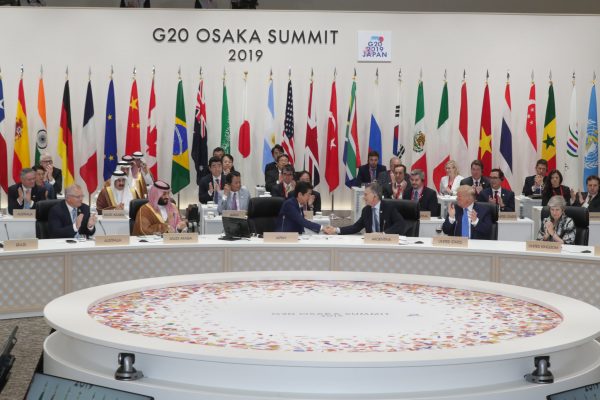Shiro Armstrong summed up this core narrative well: ‘The Osaka G20 summit may yet be remembered in history as the moment the global rules based order was lost’.
But a second narrative is emerging. There remains a strong negative tilt, particularly among media, that on the critical issues of global governance the G20 is unable to make collective progress. And there is no doubt that on rules-based trade and on climate change there remain deep divisions among the G20. The G20 platform, however, allows key defenders of the liberal international order to backstop the global order and advance collective elements. This is being led by among others Japan, Europe, Indonesia, Canada, Australia, Mexico and international institutions like the OECD, IMF and ASEAN. The G20 forum allowed all members to achieve important compromises and progress on a number of new dimensions of resilience, resistance, innovation, leadership and inclusion.
G20 leaders continued their work around macroeconomics, exchange rates and debt risks — the core reason for the G20’s inception. Paragraphs 4–7 of the Leaders’ Declaration focusses on mutual support and collective responsibility in this area, as well as a mutual commitment to monitoring debt risks.
On trade, in the era of Donald Trump’s ‘America First’ stance, the G20 could not change the United States’ ‘love’ of tariffs to solve the China–US trade conflict. The G20, however, is now committed to a one-year timeline to achieve significant WTO reforms, including action on ‘the dispute settlement system consistent with the rules, as negotiated by WTO members’. These two elements went beyond the results of the 2018 Buenos Aires G20.
The United States compromised, it appears, on a number of reforms notwithstanding its current aversion to these institutions. Despite recent misgivings, for instance, expressed by the United States regarding the Sustainable Development Goals, it is comforting to see G20 commitments noted in Paragraphs 3, 12, 23, and 27.
US President Donald Trump attended all sessions — a sign it seems of growing engagement from previous G20 summits. Putin and Brazilian President Jair Bolsonaro supported the G20’s work inside the plenary room, including the stance on climate change.
The most remarkable battle taking place at this G20 was around climate change and the Paris Agreement. The United States was adamant in maintaining its opposition to the Paris Agreement, while avoiding being isolated. Japanese Prime Minister Shinzo Abe decided to support the US desire for a low common denominator unity paragraph on climate. European leaders, including British Prime Minister Theresa May, huddled and coordinated at the G20.
They supported the strong posture taken by French President Emmanuel Macron that Europeans would not sign on to the Declaration without a strong commitment to Paris. Canadian Prime Minister Justin Trudeau supported this stance. The final outcome was a two-paragraph solution after hours of negotiations among sherpas.
Paragraph 34 for Paris supporters is a strong commitment to action climate change and other environmental causes, including mention of a necessary ‘paradigm shift’. This Paris coalition managed to retain all 19 members, including Brazil, Saudi Arabia and Turkey — all previously rumoured as possible targets by the United States. China is also on board with the Paris coalition. The United States got its paragraph 35, affirming its rationale and its own climate results without denying climate change.
This emerging coalition of supporters of a liberal international order could take the spirit of resistance further by institutionalising an alliance between the Comprehensive and Progressive Agreement for the Trans-Pacific and the European Union along a set of principles.
Beyond the confrontations around trade and climate, the summit made significant advances along a series of dimensions. All G20 members accepted the declaration of principles on ethical Artificial Intelligence prepared by the OECD. All leaders also accepted the additional declaration committing them to fight the use of the internet for terrorism and extremism, while continuing a commitment to an ‘open, free and secure internet’.
Japan pushed a working agenda on e-commerce and ‘data with trust’ though it could not gain unanimity in the end. 17 of 20 members supported the agenda. Opposition to a fully free e-commerce system included India and South Africa.
All 20 members rallied around the list of principles for quality infrastructure brokering a truce between globally accepted principles and the Chinese Belt and Road Initiative. All members committed to a one-year work plan toward an agreed digital tax, rather than engaging immediately in tit-for-tat taxation, as had been threatened by the European Union. The United States accepted a commitment to further IMF quota reforms in 2019 even though it may eventually be pushed off somewhat.
The Osaka G20 witnessed continued enlargement in circles of engagement. With Indonesia, Thailand, Singapore, and Vietnam at the table this year, ASEAN members were well represented and active. Japan also spent time meeting all engagements including Urban 20, the successor group to the C40 network of large cities.
Behind the noise of Trump’s insurgency against the liberal international order and US–China high-wire tensions, the Osaka G20 managed to show resilience, resistance and innovation. Early signs indicate a highly professional Saudi G20 team led by the former central bank governor, despite the pessimism of many around the incoming Saudi presidency.
The flurry of bilateral and multilateral meetings that took place on the sidelines of the G20 may have captured all the media attention and made the G20 highly valuable to leaders. Inside the plenary, however, the G20 continues to prove useful in constructing a collective language and structure for global governance progress, notwithstanding countries otherwise engaged in competition and struggle.
Alan S Alexandroff is Director of the Global Summitry Project, the Munk School of Global Affairs and Public Policy, the University of Toronto and Senior Editor of Oxford’s Global Summitry: Politics, Economics and Law in International Governance.
Yves Tiberghien is Professor of Political Science at the University of British Columbia (UBC), Distinguished Fellow at the Asia-Pacific Foundation, Co-Director of the UBC Centre for Japanese Research and Vision 20 Co-Chair.

